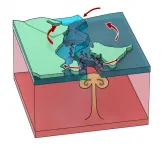(Press-News.org) Concerns have been raised about the AstraZeneca and Johnson & Johnson vaccines regarding very rare but potentially fatal side effects related to low blood platelet counts and blood clots. Recently, reports also emerged that the Pfizer-BioNTech vaccine may cause a rare yet serious side effect: heart inflammation. Concerns about side effects may trigger vaccine hesitancy, which the WHO considers one of 'Ten threats to global health'. Securing sufficient acceptance of vaccines is a key challenge in defeating the coronavirus pandemic, both now and in the future.
How can health authorities and politicians help ensure public acceptance of vaccines, which - their rare side effects aside - have proven effective in preventing serious Covid-19 disease? The best way to do this is to talk openly about all aspects of the vaccines including potential negative aspects such as side effects.
"How to communicate about the vaccines is a real dilemma. Politicians have a desire to stop the pandemic as quickly as possible, and this may give them an incentive to tone down the negative sides of the vaccines in order to vaccinate as many people as possible," says Michael Bang Petersen, professor of political science at Aarhus BSS, Aarhus University.
"But our research shows that it does not foster support for vaccination when communication about the vaccines is reassuring, but vague. On the contrary, vague communication weakens people's confidence in the health authorities, and feeds conspiracy theories. When communication is not transparent, it triggers uncertainty and people feel they may be misled," says Michael Bang Petersen.
Together with colleagues from Aarhus BSS at Aarhus University, he has studied the effect of different ways of communicating about vaccines. The study included 13,000 participants, half of them Americans and the other half Danes, and the results have just been published in the widely recognized journal Proceedings of the National Academy of Sciences of the United States of America (PNAS).
Vague communication feeds conspiracies
The results of the study show that open communication fosters support for the vaccines if it transparently describes neutral and positive facts about the vaccines. However, the willingness to be vaccinated declines when the communication is open about negative features of the vaccine.
"Transparency about the negative features of a vaccine creates hesitancy. But this hesitancy is reason-based, and accordingly health authorities still have the possibility of communicating with citizens and explain to them why it may still be advisable to accept the vaccine," says Michael Bang Petersen.
On the other hand, vague or reassuring communication, where negative features of the vaccines are toned down, lowers acceptance of vaccines. The reason is that vague communication creates a sense of hesitancy and uncertainty, and this in turn feeds conspiracy theories and reduces confidence in the health authorities.
Trust is essential
The advantage of open communication - also about the negative features - is that it prevents conspiracy theories from spreading while at the same time boosting trust in the health authorities. According to the researchers, this is key to defeating the coronavirus pandemic.
"Maintaining trust in the health authorities is extremely important because this is the most crucial factor in securing public support for the vaccines. Communicating transparently about vaccines secures the single most important factor for sustaining vaccine acceptance," says Michael Bang Petersen, and he continues:
"Openness ensures long-term trust, and this is crucial if we are to be revaccinated, or in relation to the next major health crisis."
Facts about the research:
The new findings are part of a large-scale data-driven research project entitled HOPE - How Democracies Cope with COVID-19 (https://hope-project.dk/#/). The project is financed by the Carlsberg Foundation and headed by Professor Michael Bang Petersen.
Method: Pre-registered experimental studies with a total of more than 13,000 participants, half of them Danes and the other half Americans.
The research has been published in the article "Transparent communication about negative features of COVID-19 vaccines decreases acceptance but increases trust" in Proceedings of the National Academy of Sciences of the United States of America (PNAS): https://www.pnas.org/content/118/29/e2024597118
Authors: Professor Michael Bang Petersen, Postdoc Alexander Bor, Postdoc Frederik Jørgensen and Research Assistant Marie Fly Lindholt from the Department of Political Science at Aarhus BSS, Aarhus University
INFORMATION:
Contact:
Michael Bang Petersen, professor of political science, Aarhus BSS, Aarhus University.
michael@ps.au.dk,
+45 20775944
What happens when climate change affects the abundance and distribution of fish? Fishers and fishing communities in the Northeast United States have adapted to those changes in three specific ways, according to new research published in Frontiers in Marine Science.
Becca Selden, Wellesley College assistant professor of biological sciences, and a team of colleagues examined how fishing communities have responded to documented shifts in the location of fluke and of red and silver hake. The team found that fishers made three distinct changes to their approaches: following the fish to a new location; fishing for a different kind of fish; and bringing their catch to shore at another port of landing.
Selden began this research as a postdoctoral ...
July 8, 2021 - Until relatively recently, opioids were a mainstay of treatment for pain following total hip or knee replacement. Today, a growing body of evidence supports the use of multimodal analgesia - combinations of different techniques and medications to optimize pain management while reducing the use and risks of opioids, according to a paper in The Journal of Bone & Joint Surgery. The journal is published in the Lippincott portfolio in partnership with Wolters Kluwer.
"Multimodal analgesia has become the standard of care for total joint arthroplasty as it provides superior analgesia with fewer side effects than opioid-only protocols," write Javad Parvizi, ...
Augmented reality (AR) is poised to revolutionise the way people complete essential everyday tasks, yet older adults - who have much to gain from the technology - will be excluded from using it unless more thought goes into designing software that makes sense to them.
The danger of older adults falling through the gaps has been highlighted by research carried out by scientists at the UK's University of Bath and the Bath-based charity Designability. A Paper describing their work has received an honourable mention at this year's Human Computer Interaction Conference (CHI2021) - the world's largest conference of its kind.
The study concludes that adults aged 50+ are more likely to be successful at completing AR-prompted tasks (such as 'pick up the cube' followed by 'move the cube to the blue ...
Skoltech biologists and their colleagues from Koltzov Institute of Developmental Biology, Russia, and the Chemistry Department of Taras Shevchenko University in Ukraine have discovered fairly unlikely drug candidates for treating liver fibrosis and other pathologies -- among pest control chemicals. In addition, the team looked at modifications of the medication called hymecromone, deeming them promising for anti-fibrotic drugs, too. Published in Glycobiology, the study also sheds light on the possible mechanism of action of the investigated compounds, all of which inhibit the synthesis of hyaluronic acid.
Hyaluronic acid is an important biological compound that is a key component ...
The plates of the Earth's crust perform complicated movements that can be attributed to quite simple mechanisms. That is the short version of the explanation of a rift that began to tear the world apart over a length of several thousand kilometers 105 million years ago. The scientific explanation appears today in the journal Nature Geoscience.
According to the paper, a super volcano split the Earth's crust over a length of 7,500 kilometers, pushing the Indian Plate away from the African Plate. The cause was a "plume" in the Earth's mantle, i.e. a surge of hot material that wells upwards like an atomic mushroom cloud in super slow motion. It has long been known that the ...
WASHINGTON--Tidal stresses may be causing constant icequakes on Saturn's sixth largest moon Enceladus, a world of interest in the search for life beyond Earth, according to a new study. A better understanding of seismic activity could reveal what's under the moon's icy crust and provide clues to the habitability of its ocean.
Enceladus is about 500 kilometers in diameter and almost entirely covered in ice. The moon is nearly 10 times as far away from the Sun as Earth and its bright surface reflects most sunlight, making it very cold, yet researchers have long ...
Newborn infants and babies aged up to three months should be stimulated to manipulate objects and observe adults performing everyday tasks. This incentive helps their social, motor and cognitive development, researchers note in an article published in the May 2021 issue of the journal Infant Behavior & Development.
According to the authors, from the earliest age babies watch adults carrying out activities such as handling utensils and putting them away in drawers or closets. They should themselves have frequent contact with objects to develop the ability to hold things and reach out for them. Through social interaction, ...
Diabetes is the leading cause of kidney failure in the United States, but identifying type 1 or type 2 diabetes patients at high risk for progressive kidney disease has never had a sure science behind it.
Historically, assessing kidney function meant looking at estimated glomerular filtration rate, a calculation that determines how well blood is filtered by the kidneys, and urine albumin excretion, a urine test to detect the amount of the protein albumin, which is filtered by the kidneys. However, both tests have limited predictive power in early stage diabetes when kidney function is normal.
The therapeutic approach to both type 1 and type 2 diabetic ...
A multi-institutional study has discovered spontaneous mutations in RNF2 (RING2) gene as the underlying cause of a novel neurological disorder. This Undiagnosed Diseases Network (UDN) study was led by Dr. Shinya Yamamoto, investigator at the Jan and Dan Duncan Neurological Research Institute (NRI) at Texas Children's Hospital and assistant professor at Baylor College of Medicine, and Dr. Vandana Shashi at Duke University Medical Center. Using a combination of comprehensive clinical tests, trio genome sequencing and functional studies in the fruit flies, and global gene matchmaking efforts, the teams found ...
Amsterdam, July 8, 2021 - While the literature on the digital divide has widely addressed the digital gender gap, its potential implications for electronic government (e-government) / digital government research and practice have hardly been studied. In this Special Issue of Information Polity experts characterize the current state of understanding of the issues surrounding digital government and gender and present an agenda for future research.
Gender is a neglected topic in the literature on digital government. According to the International Telecommunications Union, women are lagging behind men in making ...






